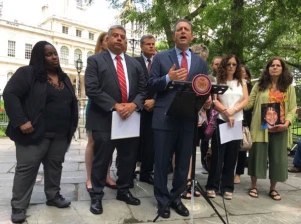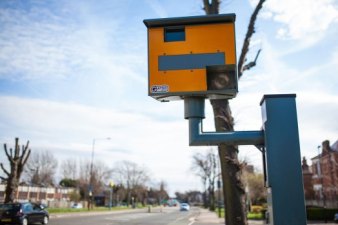You Can Get Away With Anything in Traffic Court, With a Little Patience
 What happens after a ticket is issued? For the full flow chart, see page 74 of Executive Order.
What happens after a ticket is issued? For the full flow chart, see page 74 of Executive Order.To deter dangerous driving, first you need to catch the bad behavior. That’s where Ray Kelly, the NYPD, and Albany legislators (who must grant New York City permission to install enforcement cameras) can make huge strides. But what happens after tickets are issued?
For a moving violation summons to affect driver behavior, it needs to carry real penalties in traffic court. But loopholes abound if a driver knows how to game the system. That’s where the state DMV can make a big difference.
Chapter 3 of Transportation Alternatives’ Executive Order [starts on page 35 of this PDF] explains how reckless drivers can escape consequences even after they’ve been caught violating the law. The big takeaway is that perpetrators can postpone the day of reckoning for their offenses, virtually at will. And the longer they put it off, the less the punishment matters. To understand why, here’s a quick refresher in the DMV point system.
If you’re a driver licensed in New York State:
- When you get convicted of a moving violation, points are added to your record, varying with the offense. Failure to yield? That’s three points. Exceeding the speed limit by 25 mph? Six points. And so forth.
- If you accumulate 11 points, your license is suspended. This is the major deterrent in the system.
- However, the points only count toward a license suspension for 18 months. When the time window expires, that’s that — the points are no longer "active."
- Here’s the rub: The clock starts ticking on those 18 months as soon as the cop gives you the ticket, but the points don’t appear on your record until you’re convicted.
So, let’s say a driver who already has 8 points gets a ticket for running a red light. That’s an additional three points, putting him or her over the 11 point threshold for a license suspension. But wait — the driver can reschedule their traffic court hearing multiple times. By the time the driver appears in court for the final hearing, 19 months have elapsed since the initial red light violation. The driver gets convicted, but the points don’t count toward a license suspension at all.
For those familiar with the system, the loopholes are inexcusable. Here’s Nassau County Assistant District Attorney Maureen McCormick, quoted in Executive Order: "You have to have a consequence fairly quickly after the offense for it to have any real effect. It defeats the purpose if it can go on so long that the points expire before they even get on the person’s license."
Executive Order identifies two steps DMV could quickly take to remedy the situation:
- Distribute points to licenses from the time of conviction, not retroactively from adjudication. In other words, start the 18-month clock when the driver is done with traffic court. This would ensure that points stay on drivers’ records for the full 18 months and can accrue towards suspensions.
- Allow violators to reschedule a traffic court hearing only once. Currently, cops can only reschedule a hearing one time, while drivers can postpone multiple times. If, at any hearing, the cop doesn’t show up, the ticket will be thrown out. Advantage: drivers.



